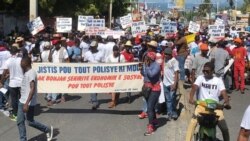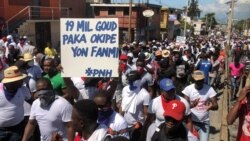Hundreds of policemen from Haiti's National Police Force, PNH, took to the streets of the capital, Port-au-Prince Sunday, dressed in civilian clothes to protest against what they say are deplorable work conditions.
The police officers, who are demanding officials allow them to form a union, complain they have not been paid for months, while being expected to risk their lives to maintain law and order. This was the first time law enforcement officers have taken to the streets since the nationwide anti-government protests began last summer.
“They are holding 6 months (of) salary they owe us, that’s not good, it’s not logical,” a policeman told VOA Creole. “When we show up somewhere and say we are police, if we don’t have a decent car to ride in they don’t even believe us – they take us for criminals because we aren’t getting paid so we can’t take care of ourselves.”
Another policeman draped in a Haitian flag and wearing a straw hat with Haiti printed in blue and red letters on it told VOA Creole they are defending rights guaranteed under the nation’s constitution.
“The constitution says we have the right to form a union, to defend our rights,” he said. “We want to thank the civilians, our wives, friends and the people of Haiti who are out here with us protesting today. We also send a warning to the police officials to say that if they think they can fire us and continue mistreating us they are wrong. If that happens the entire country will be turned upside down.”
Haiti’s National Police force has been plagued by allegations of corruption and human rights violations. Protesters often allege that men in police uniforms driving unmarked cars have been firing on them with live ammunition. The police claim to only be using rubber bullets during the protests. But the accusation was backed by opposition lawmakers and journalists covering the protests who witnessed the protesters' injuries. This, in spite of the fact that the United States has spent millions of dollars to help train the force. PNH Officials say the force that exists today is a work in progress and far more professional, but problems persist.
This weekend, the PNH intelligence chief Frantz Georges was fired by police chief Norvil Rameau after an investigation into an incident where an officer under his supervision wound up dead, with his body thrown into the street, according to the Miami Herald.
Support from lawmakers, opposition leaders
Senator Patrice Dumont, a member of parliament who is well-respected by colleagues and citizens alike for being a no-nonsense guy who shuns corruption, joined the policemen in the streets.
“I’m out here to show support for the police and to say that they should have access to services that are on par with the service they provide to society,” the senator told VOA Creole. “For example, after having served for years in the police force they should have certain social services available to them such as housing, health care and insurance.” Dumont said policemen should be paid immediately by the government when funds become available.
Opposition leader Rene Civil of the Altenativ Konsansyel pou Refondasyon Leta party (Consensual Alternative for the Refoundation of the State), also joined the policemen in the streets.
“I understand why they are protesting, they are young men and women who, after finishing school, dedicated their lives to serving the nation and they are treated like worthless individuals,” Civil told VOA Creole.
One of the policemen said they will not return to work until their demands are met.
“If they don’t respond tonight, tomorrow morning we will remain arms crossed, we will not go to work, we will not take orders (from higher ups). That’s all I have to say,” the officer, wearing a black cap with POLICE in white printed on the front, told VOA Creole.
Cape Haitian protest
In Cape Haitian, hundreds of policemen chanted slogans and held up pink posters that echoed the demands of their colleagues in Port-au-Prince for a union, insurance and better work conditions. They marched to the police headquarters and stood in front of the gates chanting.
Simultaneous anti-government protest
Meanwhile back in the capital, Protestant pastor Prophete Makenson was also in the streets with his followers after church services demanding the president step down.
“I’m just asking for a resignation, that’s why I’m in the street today,” the pastor told VOA Creole. “I’m 33 years old, like many young men out in the streets, we can’t (afford to) eat, we can’t (afford to) drink.”
Protestants joined thousands of anti-government protests for the first time last Sunday when they marched to the affluent suburb of Petionville.
Businesses targeted
The anti-government protest took a violent turn in the afternoon, undeterred by police who were busy protesting as well on the other side of town. Some protesters successfully set fire to business establishments and attempted to burn down the Canadian Embassy. They ran away when the embassy alarm sounded, alerting authorities. No damage was reported.
But in the Delmas neighborhood, the power generator at Banj, a multi-use complex that houses several tech startups was set ablaze.
Owner Marc Allain Boucicault tweeted an SOS to the local fire department to rush to the scene to extinguish the blaze, which endangered the building itself. Boucicault later tweeted that the fire had been put out but the generator was destroyed. The Banj building remained intact, he said. Last month, protesters looted the business, taking equipment, furniture and everything else they could get their hands on, incurring thousands of dollars in losses.
Protesters also targeted the Coin restaurant on the Delmas road, setting fire to the building. In the affluent suburb of Petionville, protesters set fire to a car parked at the Ponp Sol Sent Terez gas station.
The protests were initially sparked by a fuel hike in July 2018, and outrage over a corruption report that implicated the president’s businesses. Double-digit inflation, unemployment and the president’s seeming incapability to put order to the chaos that has engulfed the nation have also roiled Haiti. The weekly demonstrations have paralyzed the country, shuttering businesses and schools. The U.S. and Canada have published advisories discouraging their citizens from traveling to Haiti.
Late Thursday, the U. S. Embassy in Haiti issued a statement urging Haiti’s leaders and stakeholders to enter into dialogue to try to resolve the crisis, but the opposition, anti-corruption activists and most protesters rebuffed the call saying the international community has no business meddling in the country's affairs.
For now, President Jovenel Moise shows no signs of conceding to protesters' demands to resign, so the opposition and anti-corruption activists have called for a new series of protests to keep up the pressure.
Matiado Vilme in Port-au-Prince and Yvan Martin Jasmin in Cape Haitian contributed to this report






